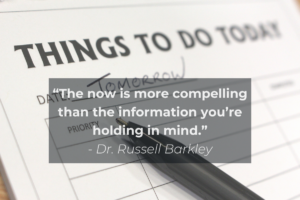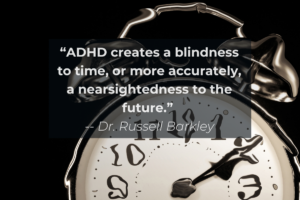People who show up late, miss the meeting, or can’t recall specific time frames of events are often referred to as unorganized, selfish, careless, unreliable, forgetful, clueless, unprofessional, disrespectful, and even rude.
How would it impact your self-esteem to know people thought of you in these terms?
I can tell you from personal experience it feels pretty lousy.
So, why, might you ask, don’t those of us who struggle with time, just get better at time management?
That is like asking someone who can’t reach the top shelf, to just “get taller”.
Much of how we process information is controlled by our brains.
It is commonly accepted that different parts of the brain are involved in processing auditory and visual information which impact a person’s sight and hearing capabilities. We would never be angry with someone because of the way they see color, perceive depth perception, or are sensitive to sound.
Yet, few understand that the processing of time involves multiple brain regions: the prefrontal cortex, the basal ganglia, deep within the brain, contributing to cognitive functions including time perception; the cerebellum, implicated in perceiving shorter time intervals; and the hippocampus, which helps in sequencing and remembering when events occurred.
Dysfunction or dysregulation in these areas or their connecting networks results in what is commonly referred to as “time blindness”.
Time blindness (a non scientific term) is used to describe a very real condition. Time blindness is when someone experiences great difficulty in perceiving and managing time, often linked to conditions like ADHD.
I can tell you, from first hand experience it does a real number on your self-esteem.
Whether it’s missing an important meeting or disappointing your “on time” partner, the feeling is the same. You look at the time and think, “I can’t believe I did it again”.
If you are an early to arrive or on-time person (OTP) who loves, lives with or works with someone with time blindness… I’m asking you to suspend judgment for just a few minutes.
While you will often hear me say that I feel my ADHD gives me many advantages, time blindness is not one of them.
Time Blindness sucks.
I’m not sharing this with you to ask for you or the world to change for those of us who have this impairment. My hope is only to enlighten and hopefully to elicit a bit of empathy for those of us who do struggle to manage it.
And, yes, managing it is our personal responsibility. But it’s not as easy as many OTPs think it should be.
I have an assistant specifically for my ADHD. It’s her job to help me manage my time blindness. Now, obviously I know most people can not afford this type of assistance. I get it.
However, as the CEO of several businesses and the responsibilities that go with it, I can’t afford not to have this person on my staff.
It’s important to understand what time blindness is and how it affects people differently.
What Is Time Blindness?
Time blindness is like having a distorted sense of time. It means you have trouble figuring out how much time has passed or how long something will take. People with time blindness often have a tough time planning, being on time, and meeting deadlines.
Neurological basis: It is thought to be connected to certain brain-related conditions like ADHD and ASD. But, it can also happen all on its own without any other neurological issues in the picture.
Individual differences: Time blindness can manifest differently in different individuals. Some people may struggle with being overly focused on a single task and losing track of time. Others may have difficulty initiating or transitioning between tasks.
Impacts on daily life: It can have significant effects on various aspects of life. It can lead to chronic lateness, missed deadlines, poor organization, and increased stress levels. Relationships, work, and academic performance may also be affected.
Not to get too technical, but…
What is the science behind time blindness?
The prefrontal cortex plays a crucial role in time perception and organization. It is responsible for executive functions like planning, attention, and impulse control. Differences or impairments in this brain region can contribute to time-related difficulties.
Working memory is a cognitive system that temporarily holds and manipulates information. It is also involved in time-related processes. Impairments in working memory can affect the ability to retain and process temporal information, making it challenging to estimate time accurately
Some researchers suggest that individuals with time blindness may have a narrower time horizon, meaning they focus more on the present moment and struggle with long-term planning and future-oriented thinking.
Let’s take a minute to take a closer look at how time blindness can impact various aspects of someone’s life…
Time Blindness In Action
Underestimating task duration
- Underestimate the time needed to complete tasks, leading to unrealistic expectations.
- Think a project will take a short amount of time, when in reality, it requires much longer
- Can result in poor planning and increased stress due to rushed or incomplete work
Procrastination
- Difficulty accurately gauging available time for tasks
- Delay starting tasks until the last minute
- May frequently miss deadlines due to poor time management
Poor Punctuality
- Struggle to estimate the necessary time for getting ready and reaching a particular destination
- Often results in frequent lateness for appointments, meetings, or social gatherings
Inefficient time allocation
- Struggle with effective time allocation across activities, often spending excessive time on low-priority or nonessential tasks
- May neglect more important responsibilities due to difficulties in prioritization
- Can lead to decreased productivity and hinder progress on crucial tasks.
Lack of preparation
- Struggle to estimate time requirements, leading to inadequate preparation for future events or deadlines
- Often leave important tasks or preparations until the last minute, causing increased stress and a decline in the quality of work
If you have ADHD, these time management issues probably feel familiar. Some people without ADHD, however, also struggle with time blindness. It’s all about how the brain develops.
While not everyone with ADHD has it, time blindness is one of the most common symptoms of ADHD.
Retired clinical psychologist, Dr. Russell Barkely has extensively explored the executive functioning impairments associated with ADHD. He has highlighted the challenges that people with ADHD face in accurately estimating time.
How are time blindness and ADHD connected?
- Impulsive behaviors, common in ADHD, can lead to difficulties in prioritizing tasks.
- ADHD impacts planning and organizational skills. Difficulties in these areas can make it challenging to allocate time appropriately.
- Many adults with ADHD report a need to always be busy or doing something. Excessive task-irrelevant activity can distract from time-sensitive tasks.
- Loss of concentration during tedious, boring, or protracted tasks is commonplace. Poor sustained attention is often cause for delay in completing objectives.
Recognizing and understanding time blindness is the first step towards finding accommodations to manage it. Various strategies can help individuals with time blindness manage their time more effectively. Cognitive-behavioral therapy (CBT), coaching, and educational interventions can also be helpful in improving time management skills.
Strategies for coping
External Cues: Set timers, alarms, or reminders for specific activities to help stay on track and transition between tasks.
Task Chunking: Focus on one thing at a time by breaking down tasks into smaller, more manageable chunks
Time Blocking: Create a visual representation of your schedule and assign specific time slots for different tasks, meetings, activities, etc.
Environmental Modifications: Organize your physical space to support focus and reduce distractions. Additionally, use noise-canceling headphones.
Self-Monitoring: Keep track of time usage and reflect on productivity with journals or apps. Monitor how you spend your time, identify patterns, and make adjustments as needed.
Some helpful tools
Visual Timers: Provide a visual countdown that makes understanding and tracking the duration of tasks and activities easier
Push Journals: Aim to enhance productivity, focus, and overall well-being by promoting a systematic approach to time management and personal growth
IFFT: Automation app that allows you to create simple conditional statements, known as applets, to connect and automate various digital services and devices
Google Calendar: Offers various views, color coding, and integration with other apps, making it helpful for managing and visualizing time commitments
Toggl: Time tracking app that allows you to monitor and analyze how you spend your time
Todoist: Task management app that helps you create and organize your to-do lists
TimeBloc: Visual time-blocking app that provides a clear visual representation of how time is allocated throughout the day
Experimenting with different options can help you discover what works best for managing your time blindness effectively.
For me, scheduling things at the wrong time has proven to be super helpful…
Let me explain.
Say I have an appointment at 12pm. My ADHD assistant will put that appointment on my calendar at 11:45am. This way, even when I think I’m 15 minutes late, I’m actually right on time (sometimes early!)
Here, in Europe, Bret isn’t playing my time management “games”.
My time blindness is perpetually one of the biggest issues in our marriage. Listen to episode #968 of The Chalene Show to hear just how bad it makes me feel.
Here’s why you want to listen to episode #997 – Life Update | Truth About Extended Travel, Kids Arrived and Time Blindness…
- Get ready with me! Makeup tips and more!
- The kids made it to France
- Tiny hotel rooms – I can’t get away from my husband
- Bret’s weight gain
- Our family plans for the week
- How my time blindness is really affecting our relationship
Check out the following links for more ADHD & time management tips…
Lack of Structure is Why Adults Discover They Have ADHD – Blog
TCS #733 – Spouse or Loved One with ADHD? Start Here!
TCS #679 – Growing Up with ADHD | A Guide for Parents
BYT #685 – ADHD Focus Tips for Entrepreneurs
BYT #449 – Advice for Easily Distracted Entrepreneurs | ADHD Management





